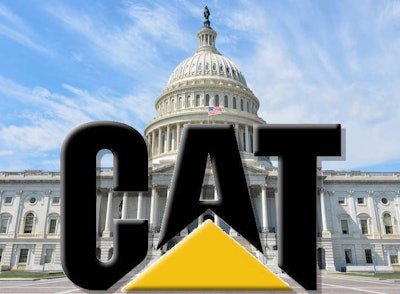
After a review of the company’s 2007 to 2009 tax returns, which include a loss carryback to 2005, the Internal Revenue Service has levied $1 billion in penalties and increased taxes on Caterpillar.
According to a Tuesday securities filing, Cat says it received the IRS report January 30 notifying the company that the agency intends to tax profits earned from Caterpillar SARL (CSARL), a Switzerland-based parts subsidiary. Unrelated to the Swiss unit, the IRS informed the company that it would also disallow approximately $125 million of foreign tax credits from other financings.
Cat says it intends to “vigorously contest,” the increased taxes and penalties on CSARL through an appeal and adds that it does not anticipate the agency’s decision to have much of an impact over the next 12 months.
“We believe that the relevant transactions complied with applicable tax laws and did not violate judicial doctrines,” the company states in the filing. “…We have filed U.S. tax returns on this same basis for years after 2009. We currently believe the ultimate disposition of these matters will not have a material adverse effect on our consolidated financial position, liquidity or results of operations.”
Beyond the decision on the Swiss unit, in the Tuesday securities filing Caterpillar said it was notified on January 8 of a grand jury subpoena from the U.S. District Court for the Central District of Illinois requesting documents and information on the company’s movement of cash between all U.S. and non-U.S. subsidiaries.
Caterpillar said in the filing that it is cooperating with the investigation.
“The Company is unable to predict the outcome or reasonably estimate any potential loss; however, we currently believe that this matter will not have a material adverse effect on the Company’s consolidated results of operations, financial position or liquidity,” the filing reads.
Cat’s scuffle with the U.S. government over profits earned overseas began last year. In April the company appeared before a Senate subcommittee to defend a tax strategy that allowed the company to avoid $2.4 billion in federal taxes. The company was found innocent of any legal wrongdoing but was criticized by Michigan Democratic Sen. Carl Levin for costing, “the U.S. Treasury billions of dollars.”
In 2014, the company’s sales fell 1 percent to $52.1 billion while profit fell 2 percent to $3.7 billion, or $5.88 per share. The company attributed the decline in sales to further lack of demand for mining equipment. Looking forward to 2015 the company expects a further drop in sales to $50 billion due the “dramatic decline in the price of oil,” Cat CEO Doug Oberhelman said.
“Current oil prices are a significant headwind for Energy & Transportation and negative for our construction business in the oil producing regions of the world,” Oberhelman said in a statement.










